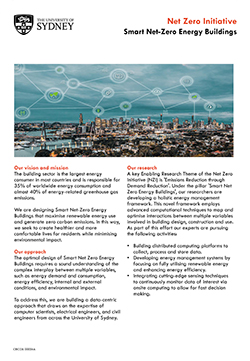The challenge
The building sector is the largest energy consumer in most countries and is responsible for almost half of greenhouse gas emissions. Smart Net-Zero Energy Buildings (nZEB) that maximise renewable energy use will play an important role in emissions reduction. The optimal design of such buildings requires a sound understanding the complex interplay between multiple variables, such as energy demand and consumption, energy efficiency, internal and external conditions, and environmental impact.
Why this research is valuable
NZI researchers are developing a holistic energy management framework for the design of Smart Net-Zero Energy Buildings (nZEB). Specifically, they are using advanced computational techniques that can integrate and reconcile an array of variables affecting sustainable design and then generate accurate energy profiles for each building. This strategy will allow a leap towards realising nZEB by facilitating the design and renovation of buildings that maximise renewable energy use and contribute positively to human health and well-being.
Smart Net Zero Energy Buildings – Research themes
- Building a three-tier edge computing system (sensors-edge-cloud) to reduce delay in turnaround times, achieve confidential data sharing, and overcome other issues that commonly occur in large-scale distributed systems.
- Developing a building energy management system that helps maximise the renewable energy use in the buildings and optimises the overall building energy profiles. This system will incorporate renewable energy generation prediction, energy storage management, data-driven analyses of residents’ behaviour and energy consumption, energy efficiency studies, and electricity trading components.
- Proposing cutting-edge sustainable building technology to i) enable the use of continuous monitoring of data and ii) optimise necessary repairs and enhancement of building materials throughout the lifetime of the building.
Want to know more?
This leading-edge research will advance nZEB technology. Click here if you want to know more or are interested in joining our research team.


